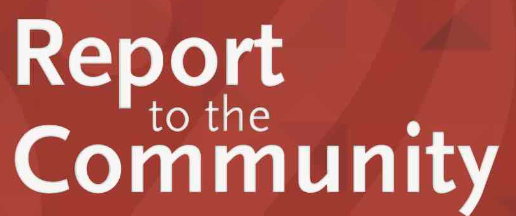Report to the Community (2018-2019)
​
During the 2018 – 2019 our school continued its work on responding to student well-becoming and mental health as well as embarked on the 91Ě˝»¨app's Writing Project initiative. Both experiences were enriching and informative and the ripples of these priorities will continue through our school in the years to come.
The focus on well-becoming and mental health was best represented through the CLUB HB program. This wonderful program has proven to be an exceptional way for the students throughout the entire school to get to know schoolmates from throughout the building and a safe, structured and meaningful environment. The students were divided into six mixed-aged groups and worked with teachers and educational aides. Each of the six groups focused on different aspects of well-becoming and mental health. The groups included:
- Nutrition (how does eating well and making food so others eat well make us feel good?)
- Physical Activity (how does being active make us feel better?)
- Mindfulness (how do strategies such as Breathing exercises, drawing, etc. to help us self-regulate?)
- Board games (how does playing nicely with others, taking turns, engaging in healthy competition engage our mind differently?)
- Innovation (how does working in groups to solve problems and come up with creative solutions take us away from our problems?)
- Volunteering at Action Marguerite (how doe helping others and doing good in our community give us purpose and make us feel better?)
Some of the feedback students shared with us included, "working with the residents of Action Marguerite helped us understand those with different needs." Playing board games with students of different grades and classes "encouraged teamwork". The Innovation grouping once again served as an opportunity for "team building and feeling like we were part of a larger community beyond our classroom." The explicit teaching of mindfulness was important as we all need strategies "to stay calm, so later on, when we get a job, we can stay calm and not be fired because we can't manage our stress." The students also shared that working with students from completely different grade levels was great because it reinforced "our need to be patient because we were at different grade levels and we can all use the skill of patience in every day of our lives."
Additionally, four teachers formed a core group to introduce the Writing Project to our building. Their classes ranged from Grades 4 through 7. Their practices were informed through professional reading, observations of classrooms where the Writing Project was already embedded as well as collaboration. Teachers developed research informed instruction and helped students see themselves as writers whose texts are infused with purpose and their audience in mind. Again and again, teachers visited why students were writing and for whom? All this in an effort to help make students see writing as meaningful and pertinent to their learning.
Students who engaged in the Writing Project in their classroom noticed how their teachers gave them many examples of what their writing could look like and discussed critically these professionally written texts. Then the process of watching their teachers engage in an
- "I do" (where teachers vocalize their writing process and students stop frequently to share their observations on that process);
- "We do" (where students contribute to the writing of a collective text, thereby applying their knowledge as a group);
- and a "You do" (where students apply their skills on their individual texts – all the while being supported by conferencing, reciprocal teaching and revisiting their own work). Some of the students described the conferencing as being particularly important as "there was a fresh set of eyes and a new point of view on our work. So, ideas you couldn't see before, were suddenly there."
In one class, the students wrote a letter to be delivered on the 10th birthday of their Roots of Empathy baby (the same age that the students were this past year) and shared their memories of the baby and asking her questions about life in 2028; another group married Français and Sciences naturelles by writing a book on dangerous species and their importance; another group wrote letters of appreciation to an adult from École Provencher who they hold dear, a group wrote a guide to newly arrived Canadians about what Canada meant to them and their hopes for these new Canadians. Finally, a group wrote short stories based on the theme of making a great escape! The chance to share their letter with their audience, seeing others look at their books in the library and their old classroom has added an extra layer of excitement and reminder of the pertinence of what they wrote.
As one can see, our school helped our students grow on various levels – both through academic and socio-emotional levels. We look forward to growing in similar manners in the years to come.

